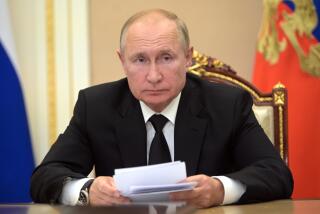Ailing Yeltsin Insists He Won’t Cede Any Power
- Share via
MOSCOW — Russian President Boris N. Yeltsin gave a tug on the reins of power from his sickbed Wednesday, insisting through his spokesman that he doesn’t intend to give up any authority despite his long series of debilitating illnesses.
Yeltsin indicated, however, that he supports the idea of reaching a truce with the country’s obstinate Communist-led parliament in order to preserve stability during the run-up to national elections later this year.
“The president’s fundamental position is that the constitution enshrines the rights of all the branches of power, including the president,” spokesman Dmitri D. Yakushkin told a Kremlin news conference. “He is not renouncing his rights and does not intend to.”
But Yakushkin added: “We are entering the election year, and the idea is to hold the election on time and in a civilized way. . . . Everything should be done to consolidate stability.”
Yakushkin’s comments appeared to be an attempt by Yeltsin to quash speculation that he is ready to agree to a truce with parliament in which he would give up some of his sweeping powers in return for legislative cooperation.
Yeltsin, who will turn 68 on Monday, has been hospitalized since Jan. 17 with a bleeding ulcer--the latest in a string of illnesses that have included heart trouble and what the Kremlin has called “nervous exhaustion.”
The Kremlin released new footage of Yeltsin on Wednesday showing the president sitting stiffly in an armchair wearing a patterned cardigan and black pants. Yeltsin was seen--but not heard--chatting with Prime Minister Yevgeny M. Primakov, who met with the president at the Central Clinical Hospital.
Yakushkin said Yeltsin is likely to remain in the hospital until the end of the week, after which he will need an additional period of convalescence. Yeltsin has been out of the public eye since early December.
In his absence, Russia’s day-to-day affairs have been in the hands of Primakov, the stolid former foreign minister who became prime minister in September at the end of a long season of acrimony between the president and parliament.
Last week, Primakov sent parliamentary leaders a letter suggesting a kind of gentlemen’s agreement between the executive and legislative branches in which parliament would drop its anemic impeachment drive against Yeltsin and would pledge not to call a vote of no confidence in the administration. In return, the president would promise not to fire his Cabinet or dissolve parliament’s lower house, the Duma.
Last year, Yeltsin played a game of political brinkmanship with parliament in which he repeatedly fired prime ministers and threatened to dissolve the lower house and force early national elections. Parliamentary elections are scheduled for December and are to be followed by the presidential election in June 2000.
Under the constitution, the president has sweeping autocratic powers, including the right to dissolve the Duma if members vote no confidence in the prime minister or three times reject the president’s nominee for the post.
Primakov’s letter to the legislative leaders drew a swift denial from Yeltsin on Tuesday that he was prepared to cede some powers--prompting feverish media speculation about a rift between the president and prime minister.
But the two insisted Wednesday that they had been reading from the same page all along and that Yeltsin had instructed Primakov to discuss terms of a potential truce, although the president did not review the text of the letter before it was sent.
“The president and premier work in close contact,” Yakushkin insisted. “These two individuals respect each other’s positions, and there exists an understanding between them.”
At least one analyst, Leonid A. Radzikhovsky of the newspaper Sevodnya, saw more selfish forces at work.
“This letter shows what’s really on Primakov’s mind,” he said in a telephone interview. “If the letter is approved, Primakov will get a guarantee from Yeltsin and from the Duma that he will retain his post at least until the year 2000.”
More to Read
Sign up for Essential California
The most important California stories and recommendations in your inbox every morning.
You may occasionally receive promotional content from the Los Angeles Times.













